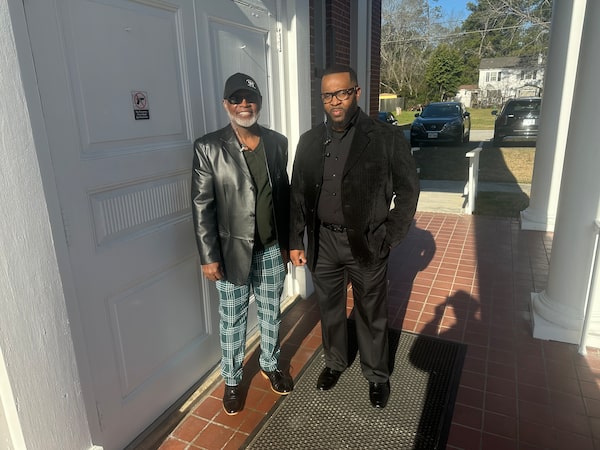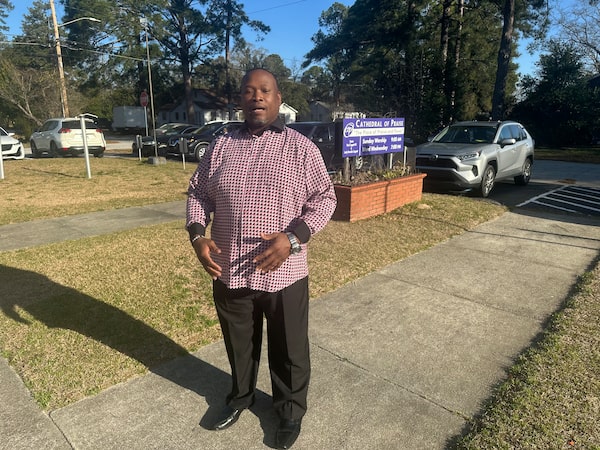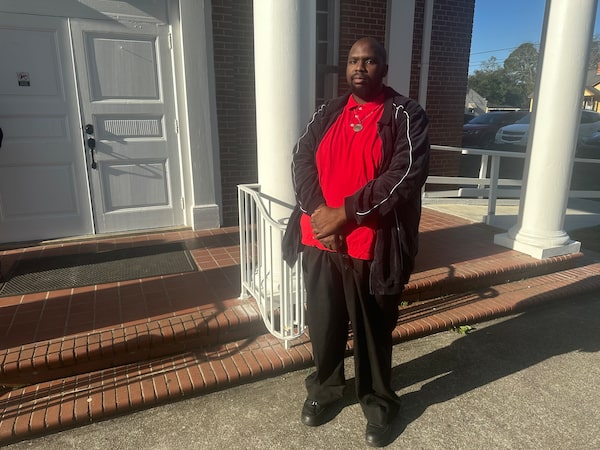
Kayle Jones, 61, left, and David Evans, 41, outside the Cathedral of Praise in Augusta, Georgia, on Feb. 25.Adrian Morrow/The Globe and Mail
In 2020, Kayle Jones cast his ballot for Joe Biden. A 61-year-old factory worker in Augusta, Ga., Mr. Jones usually votes Democrat and that pandemic election provided additional impetus: the chaos of then-president Donald Trump’s handling of the coronavirus, not to mention the persistent drama surrounding his White House. “Everybody was so up in turmoil. They wanted a change from all the lies and the backstabbing,” he recalls.
In the years since, Mr. Jones has become ambivalent about Mr. Biden. And there are very different political issues at the top of his mind now: the number of migrants coming across the southern border and the amount of money the country has spent on military aid to Ukraine. Mr. Jones doesn’t know what he will do in November’s presidential election. He may even vote for Mr. Trump.
“One thing we need to do is get a hold of that border. And foreign countries are getting more help than we are – we don’t take care of our own but we take care of somebody else,” he says one Sunday morning as he waits for a service to start at the Cathedral of Praise, a red-brick church in a working-class neighbourhood of clapboard bungalows. “People don’t know which way to go right now.”
Even being open to voting Republican puts Mr. Jones in a small minority of Black Americans. Since the 1960s, this demographic has typically favoured the Democrats by margins of 80 to 90 per cent. But recent polling suggests support for Mr. Biden may be eroding. A Siena College survey last month showed him with the backing of 71 per cent of Black voters – a 20-point drop from his 2020 result.
John Robertson, one of Mr. Jones’s fellow congregants, went for the Democrats in 2020 but doesn’t feel things have changed for the better. Groceries are more expensive, for instance. Not that he likes Mr. Trump much: He describes the former president as “crazy” and is particularly bothered by his sexist language. The 41-year-old truck driver doesn’t know whether he will bother voting at all this year.

John Robertson, 41, went for the Democrats in 2020 but doesn’t feel things have changed for the better.Adrian Morrow/The Globe and Mail
“I wish they would have better candidates than what they’ve got because neither Biden nor Trump is a choice for me,” he says. “Both of them are up there in age. They’ve got to hang it up.”
Even if he makes no inroads among Black voters, Mr. Trump could benefit from disaffection such as Mr. Robertson’s. Given the knife-edge nature of swing states such as Georgia, a small drop in Black turnout could cost Democrats the White House. Both Mr. Biden and Hillary Clinton won about 90 per cent of Black votes but higher overall Black turnout – 63 per cent nationwide in 2020 compared to 59.6 per cent in 2016 – helped put Mr. Biden over the top.
It all means that much of Democrats’ success or failure this year depends on motivating their most loyal voting bloc. Places such as Augusta, a majority-Black city of just more than 200,000 people, could determine the election’s outcome.
At Broadway Baptist, a cavernous megachurch on a suburban arterial road, pastor Anthony Booker is deeply concerned about voter apathy. These houses of worship are at the centre of political organizing in the South and Rev. Booker does his part. His parishioners run voter registration drives and Souls to the Polls events that bus people to vote.
“We are a voting church,” he declares in his sermon this sabbath. “People died so that you and I might have this opportunity.”
Many congregants feel little inspiration to cast a ballot, he says in an interview, so he tries to encourage them to at least vote against the things they don’t want. “There is a lack of enthusiasm for this presidential run. People feel that things haven’t changed for them. But the other choice is worse.”
Georgia’s Republican state government has also brought in a string of rules that make it harder to vote. Voting rights activists charge that these changes – which include restrictions on early voting days and ballot drop boxes, and a ban on handing out food or water to voters in line – are meant to discourage minority, urban and low-income voters, who typically back the Democrats.
In a state that Mr. Biden won by fewer than 12,000 votes, even stopping a small number of people from turning out could make the difference.
Milling about the nave after the service, Stephanie Calloway expresses some bafflement that anyone would feel less impetus to head to the polls now than they did four years ago. She doesn’t see Mr. Trump running on policies that would tangibly improve people’s lives.
“All he does is name-call. He doesn’t talk about the needs of the people,” says Ms. Calloway a 50-year-old pharmacist. “I don’t know why people would be less motivated. People don’t vote and then complain.”
Mr. Trump “has not been for the little man,” says Cheryl Dunn, 64, a retiree. “If you’re not in his class, I don’t think you stand a chance of anything good happening.” She cites, by contrast, Mr. Biden’s work to cap the price of insulin. Having voted in every election since she was 18 years old, she plans to volunteer this year with a voter registration campaign put on by her sorority.
Kiara Manning, a 27-year-old magazine writer who lists health insurance, student loans and jobs as top issues, is equally certain for whom she will not be voting. “Trump goes against everything I believe in, personally. He doesn’t have the best interests of people of colour at heart.”
Standing in the late winter sunshine outside the Cathedral of Praise, Gavin Price says that, for some of his friends, even Mr. Trump’s attempts to overturn the 2020 election and instigation of the Jan. 6, 2021 Capitol riot are not disqualifying.

Gavin Price, 34, says of Donald Trump: 'Everybody should vote to not let a bigot back into the White House.'Adrian Morrow/The Globe and Mail
“They say ‘he didn’t do anything wrong.’ I say ‘he did everything wrong’,” says Mr. Price, 34, who also cites Mr. Trump’s handling of the George Floyd protests, during which he had a crowd pepper-sprayed so he could stage a photo-op. “Everybody should vote to not let a bigot back into the White House.”
David Evans, a 41-year-old engineer, says he’s planning to vote and “not for that guy with the orange hair.”
“He makes people go back to the way it used to be. He sent in the Proud Boys. He hates on Mexicans,” he says. “Dr. King worked so hard to bridge that gap. To bring us together. The vast majority want things to be that way.”
Not everyone, even those who evince antipathy toward Mr. Trump, is quite so inspired to go to the polls. “No matter how you vote, it’s the same thing,” says Roy Price, a 66-year-old retired house painter. “You’re stuck between a rock and a hard place.”
 Adrian Morrow
Adrian Morrow